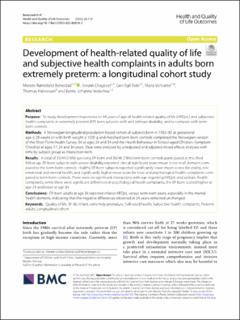| dc.contributor.author | Benestad, Merete | |
| dc.contributor.author | Drageset, Jorunn | |
| dc.contributor.author | Eide, Geir Egil | |
| dc.contributor.author | Vollsæter, Maria | |
| dc.contributor.author | Halvorsen, Thomas | |
| dc.contributor.author | Vederhus, Bente Johanne | |
| dc.date.accessioned | 2022-10-13T08:55:56Z | |
| dc.date.available | 2022-10-13T08:55:56Z | |
| dc.date.created | 2022-08-20T17:37:17Z | |
| dc.date.issued | 2022 | |
| dc.identifier.citation | Benestad, M. R., Drageset, J., Eide, G. E., Vollsæter, M., Halvorsen, T., & Vederhus, B. J. (2022). Development of health-related quality of life and subjective health complaints in adults born extremely preterm: a longitudinal cohort study. Health and Quality of Life Outcomes, 20(1):112. | en_US |
| dc.identifier.issn | 1477-7525 | |
| dc.identifier.uri | https://hdl.handle.net/11250/3025806 | |
| dc.description.abstract | Purpose
To study development trajectories to 34 years of age of health-related quality of life (HRQoL) and subjective health complaints in extremely preterm (EP) born subjects with and without disability, and to compare with term-born controls.
Methods
A Norwegian longitudinal population-based cohort of subjects born in 1982–85 at gestational age ≤ 28 weeks or with birth weight ≤ 1000 g and matched term-born controls completed the Norwegian version of the Short Form Health Survey-36 at ages 24 and 34 and the Health Behaviour in School-aged Children–Symptom Checklist at ages 17, 24 and 34 years. Data were analysed by unadjusted and adjusted mixed effects analyses with time by subject group as interaction term.
Results
A total of 35/49 (73%) surviving EP-born and 36/46 (78%) term-born controls participated at this third follow-up. EP-born subjects with severe disability reported clinical significant lower mean score in all domains compared to the term-born controls. Healthy EP-born subjects reported significantly lower mean scores for vitality, role emotional and mental health, and significantly higher mean score for total and psychological health complaints compared to term-born controls. There were no significant interactions with age regarding HRQoL and somatic health complaints, while there were significant differences in psychological health complaints; the EP-born scored higher at age 24 and lower at age 34.
Conclusions
EP-born adults at age 34 reported inferior HRQoL versus term-born peers, especially in the mental health domains, indicating that the negative differences observed at 24 years remained unchanged. | en_US |
| dc.language.iso | eng | en_US |
| dc.publisher | BMC | en_US |
| dc.rights | Navngivelse 4.0 Internasjonal | * |
| dc.rights.uri | http://creativecommons.org/licenses/by/4.0/deed.no | * |
| dc.title | Development of health-related quality of life and subjective health complaints in adults born extremely preterm: a longitudinal cohort study | en_US |
| dc.type | Peer reviewed | en_US |
| dc.type | Journal article | en_US |
| dc.description.version | publishedVersion | en_US |
| dc.rights.holder | © The Author(s) 2022. | en_US |
| dc.source.volume | 20 | en_US |
| dc.source.journal | Health and Quality of Life Outcomes | en_US |
| dc.source.issue | 1 | en_US |
| dc.identifier.doi | 10.1186/s12955-022-02018-5 | |
| dc.identifier.cristin | 2044648 | |
| dc.source.articlenumber | 112 | en_US |
| cristin.ispublished | true | |
| cristin.fulltext | original | |
| cristin.qualitycode | 1 | |

